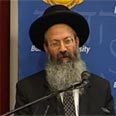
Rabbi of Har Bracha yeshiva: Most Rabbis agree with me
Rabbi Eliezer Melamed says his position 'more or less accepted by all hesder yashivas rabbis'; claims was 'obligated to retain independent position, not succumb to defense minister's tyranny'
Rabbi Eliezer Melamed, head of the Har Bracha yeshiva made his first comments on the severed ties between the IDF and his yeshiva, saying he agreed with the position presented to the IDF by the heads of hesder yeshivas.
However, Melamed said, "I didn't agree to sign anything because I believe you should not express yourself whilst under governmental pressure.
"Although I knew the defense minister's (Ehud Barak) rude discourse might lead to the termination of the arrangement with the Har Bracha yeshiva, and with all the harsh consequences involved, I was obligated to retain an independent position and not succumb to his tyranny," added Melamed.
In an article published on the Arutz Sheva website, Rabbi Melamed noted that his stance was "more or less accepted by all hesder yashivas rabbis."
According to Melamed, the principles brought forth in a letter sent by the hesder yashivas association to the head of IDF's manpower directorate, in which they shirk responsibility for political protest in the military, are accepted by him, yet he does not identify with the decisive tone of the letter.
"I understand and respect the protestors, and believe they are protesting a just cause, however I think these protests are best held in a civil framework in order to not harm the military system," Melamed explained.
According to Melamed, "A rabbi is obligated to speak his inner truth, which is how he represents our people's blessed heritage. This also goes for the heads of hesder yashivas that are not subordinate to IDF commanders and should speak their mind freely."
"What if there was a Rabbi who honestly thought it was one's duty to protest during military ceremonies? Should he shut up? Keep his opinions to himself? Is it not his duty to express his opinions?" he added.
Freedom of thought and speech
"I didn't agree to appear for a hearing or be subpoenaed under an ultimatum," explained Melamed, "these expressions are not befitting of someone who is obligated to exercise freedom of thought and speech…it seems their minds were made up, for reasons I will not elaborate on at this time."
At the beginning of the article, Melamed stated that he had already expressed his opinion in writing immediately after the first incident of insubordination protests in Shimshon battalion, and "not under pressure from the authorities."
In his column in the national religious newspaper Besheva, Melamed wrote: "If they would have consulted me, I would have told them to abstain from these actions. A soldier must refuse only if he is ordered to aid with the removal of people. However, there is no reason for him to protest in a swearing-in ceremony."
"In addition," wrote Melamed," I would have dissuaded them because I could imagine such protest would lead to a great deal of distress for their direct commanders."
Melamed said that in retrospect he "respected their actions and recognized the benefit these public acts of protest provide."










